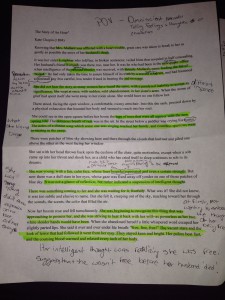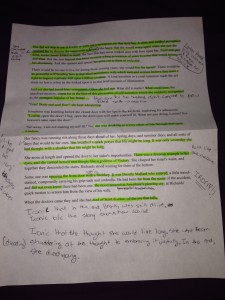Zenia McLeod,
“The Story of An Hour” talks about a woman, Louise Mallard, and how the news of her husband’s death forced her to go through an emotional thought process of her life. This story reveals how she responds and why she feels the way she does. At first, she is saddened by the news. However, as she sits in her room and looks out the window, she feels an intelligent thought coming to her from a break of clouds in the sky. She feared the thought, but couldn’t help to realize that she was free from the rule of her husband. As Louise embraced this idea, she felt alive (‘her pulses beat fast, and the coursing blood warmed and relaxed every inch of her body.’). Regardless of the bitter moment of grief she would endure when seeing her husband at his funeral, she looked forward her new long life. She evening prays that her life might be long. These words had a different meaning to her before the news of her husband. She used to dread the thought of living long under his way of taking power and her will from her. Now, her prayer is that life might be long so she can embrace living in her own power and will. She can do and think what she pleases, which made her feel victorious. However, all of these feelings revelations crashed when she saw her husband walk through the front door. The joy of her husband’s death suddenly vanished, and her heart couldn’t take the immediate change of how her future was no longer hers. The irony is that sadly, she doesn’t live long. She never thought that she would die young. When she had her husband, she was focused on having to be with him forever. After his death, her focus was now living on her own the way she wanted to. Then, the unexpected happened when her husband came home. All that she had discovered now meant nothing. Her heart, which was filled with joy for a moment, failed.






The Story of an Hour by Kate Choplin was a very ironic story. As the story begins, you can’t help but to feel bad for, Mrs. Mallard. She was introduced as a woman who seems very fragile, and obviously it’s because of her heart problems. In the beginning of the story, the author makes us believe that Mrs. Mallard cares a whole lot about her husband, Brently. The author says that her sister Josephine told the new to her with broken sentences, meaning that she wasn’t sure how to tell her the bad news lightly. When the news was broken to her, she cried in her sisters arms and then made her way to her room, alone. The author speaks about a physical exhaustion that Mrs. Mallard had felt, that reached into her soul. Also how she was just looking out her window, crying similar to a child that had cried itself to sleep. At this point in the story I thought that the story would go on about all the pain she felt or how she would later on deal with the loss. It was very interesting when the author spoke about an intelligent thought that Mrs. Mallard had had because who really thinks in a situation like this. It all became a bit clear when Mrs. Mallard was shouting out free, but was also very ironic. It was very odd because Brently was not sick, he had died in an accident so it couldn’t have been a “My husband was very sick, he’s free from all pain” thing. We later on find out that she herself had been freed from a man who “..had never looked save with love upon her..” It was as if Mrs. Mallard felt relief by his death. When Josephine hears Mrs. Mallard speaking to herself and tells her to stop because it would make her ill, I thought maybe Mrs. Mallard was telling herself these things to console herself, since she did have heart problems. The big twist to the story was when Mrs. Mallard goes downstairs with her sister and we later find out that Mrs. Mallard had actually died of heart disease from joy. Also the fact that her husband Brently had not died.